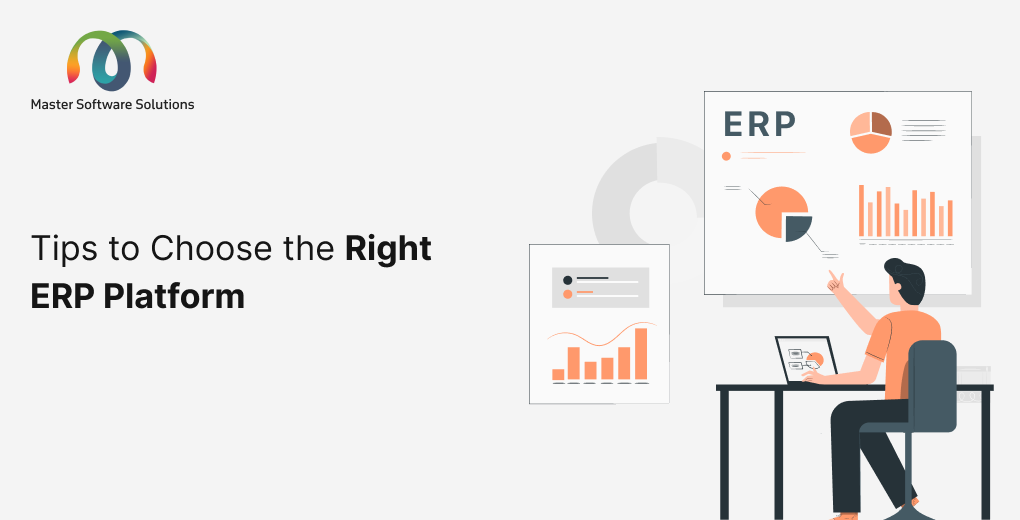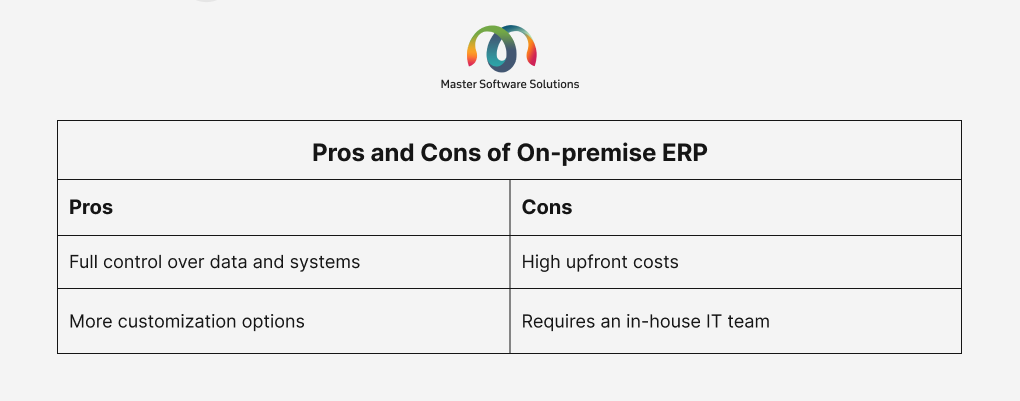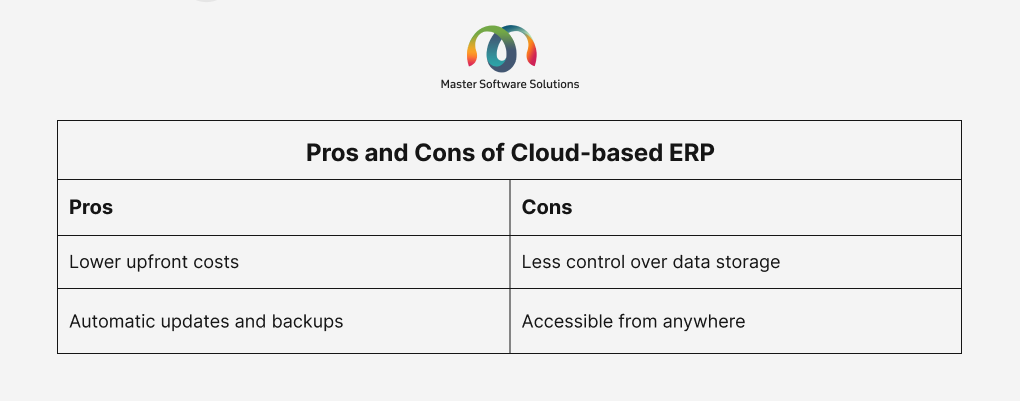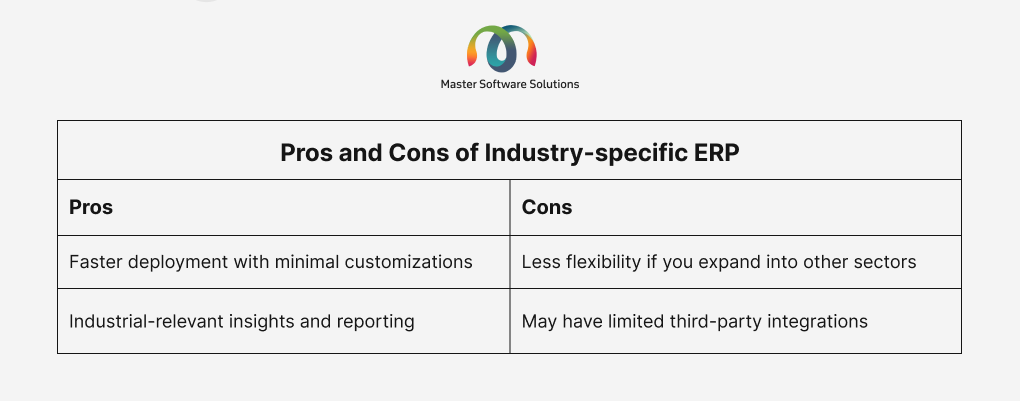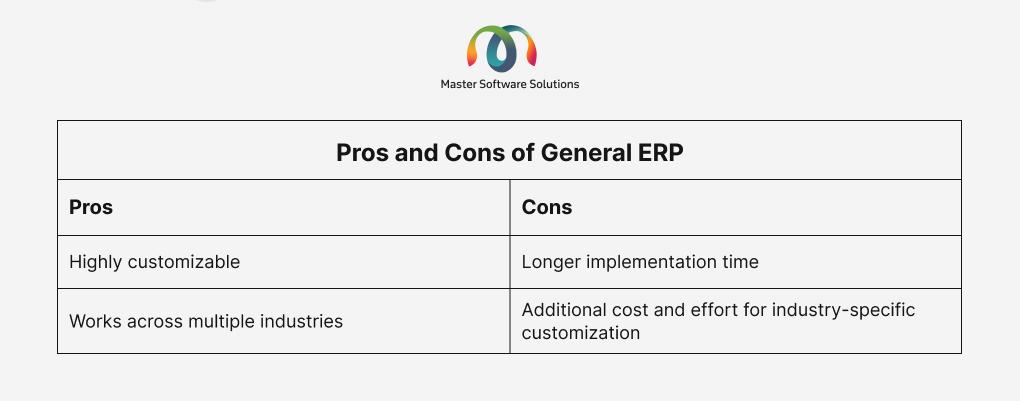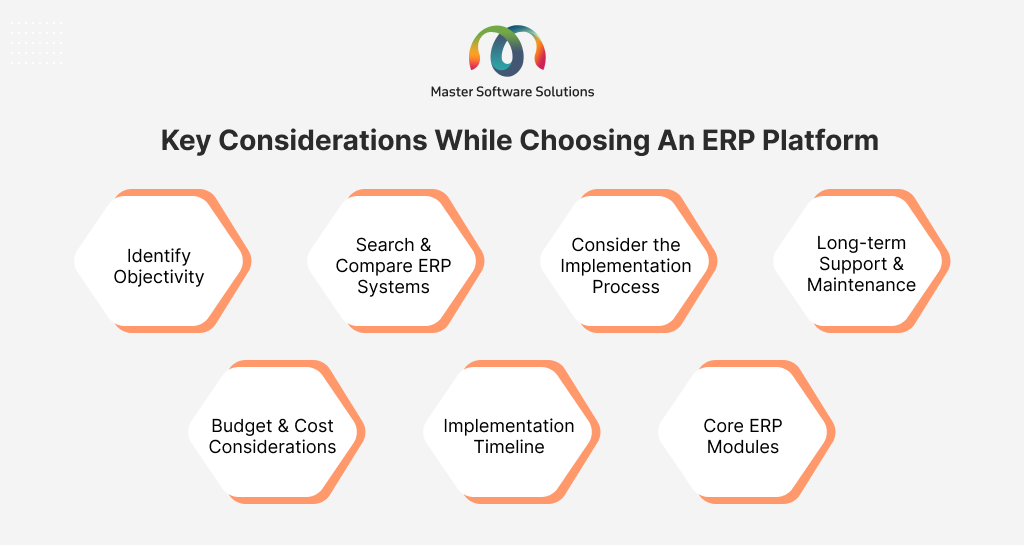With multiple ERP platforms available, choosing the best one can be challenging and perplexing. However, selecting an ERP platform is a critical step in ensuring the system’s effectiveness.
This blog focuses on understanding the key factors involved in ERP selection to help you choose the right platform for your business.
This blog covers;
Understanding ERP types
Enterprise resource planning (ERP) systems are essential for streamlining operations, improving productivity, and ensuring data consistency across departments. However, choosing the right ERP depends on how it’s deployed and whether it suits your industry needs. The major types of ERP are:
On-premise vs cloud-based ERP
On-premise ERPs are locally hosted on the company’s server and infrastructure. The system is controlled and maintained by the organization’s IT team. Hardware and software licences are the upfront investment included in on-premise ERP systems. These ERP systems are suitable for companies that need custom configurations, strict data control, or have limited internet access.
Cloud-based ERP is hosted on the vendor’s servers and accessed via the internet. It is hosted as software as a Service (SaaS). It involves monthly or annual subscription fees and is ideal for businesses that value scalability, remote access, and low maintenance overhead.
Industry-specific vs general ERP
Industry-specific ERPs are designed with tailored features and workflows for particular industries, including manufacturing, retail, food, and beverages. It addresses unique regulatory, operational, and compliance needs. These ERPs generally include pre-built modules aligned with the sector’s best practices. Master Software Solutions has designed ERP solutions using Odoo specifically for the bottled water, dairy, and coffee roasting industries.
A general ERP, on the other hand, is designed to serve a diverse range of industries through generic modules, such as finance, human resources, inventory, sales, and purchasing. They require more customization to fit industry-specific processes. These ERPs are ideal for companies with diverse operations or those wanting more flexibility.
Key considerations while choosing an ERP platform
Choosing the right ERP platform is critical and can significantly impact a business’s efficiency, scalability, and bottom line. Here are the important factors you must consider when choosing an ERP platform:
Identify business objectivity
This is one of the initial steps that will help you understand your goals, such as inventory control, streamlining operations, enhancing customer service, and supporting future growth. Having an in-depth understanding of your business’s objective helps determine the features and functionalities of your ERP system.
Research and compare ERP systems
Assess whether the ERP system aligns with your business workflows, industry requirements, and internal processes. Choosing such a system reduces the need for heavy customizations, lowers implementation costs, and speeds up adoption. Include your functional heads and IT team during this stage to gain a comprehensive understanding of usability and compatibility. If you do not have an IT team, we can help you. Master Software Solutions offers ERP consulting services to help you understand ERP platforms that can fit your business.
Consider the implementation process
ERP implementation can be complex, often involving data migration, system configuration, user training, and process adjustments. Ensure that your ERP partner offers a structured implementation plan, reasonable timelines, and support resources. Ask about potential downtime, hidden costs, and how disruptions can be minimized.
Look for long-term support and maintenance
ERP systems are not a one-time investment; they require regular updates, technical support, and new modules as your business evolves. Ensure that your ERP implementation partner provides dependable post-implementation support, flexible service-level agreements, and continuous system enhancement. Ongoing support is essential to keep your ERP up-to-date and aligned with changing business needs.
Budget and Cost Considerations
This is a critical factor in selecting an ERP platform. ERP systems involve both direct and indirect costs, such as:
- Software licensing or subscription fees
- Implementation charges
- Customization costs
- Training fees
- Recurring ongoing support
It is essential to look beyond the initial cost and consider the total cost of ownership (TCO) over a period. Cloud-based ERPs usually have lower initial costs but recurring subscription fees, while on-premise solutions require a higher initial investment in infrastructure and maintenance. Ensure that you account for hidden expenses such as third-party integrations, data migration, or the need to hire specialized IT staff. A well-planned budget should align with your expected ROI and growth trajectory.
Implementation Timeline
ERP implementation is not an overnight process; it can take several weeks to several months, depending on the size and complexity of your business. Delays in implementation can disrupt operations, increase costs, and lower team morale. Therefore, it is essential to set realistic timelines and milestones in coordination with your ERP odoo partner. The timeline should consider key phases, including system configuration, data migration, employee training, testing, and final go-live. Choosing a vendor with a clear, structured, and proven implementation methodology can help reduce risks and ensure a smoother transition to the new system.
Core modules to look for in an ERP
Based on your business processes, it is crucial to select ERP modules that can help you automate end-to-end operations. ERP software solutions contain modules that are not necessary for your enterprise. This makes choosing the right modules crucial. The core modules businesses must look for are:
Financial management
These modules include managing general ledgers, accounts payable, accounts receivable, budgeting, asset management, and tax compliance. It ensures that all transactions are recorded accurately, helping businesses maintain financial health and meet regulatory requirements.
Inventory management
The inventory module is crucial for stock tracking, warehouse space management, automating purchases, and maintaining inventory valuation. It helps businesses avoid stockouts or overstocking, reduces carrying costs, and improves order accuracy and fulfillment speed.
Supply chain management
The SCM module streamlines procurement, vendor management, logistics, and order tracking. It enhances the end-to-end visibility of the supply chain, improves collaboration with suppliers, and ensures the timely delivery of goods.
Human Resource Management
The HRM module manages employee data, payroll, attendance, recruitment, leave management, and performance tracking. Automating these tasks reduces manual errors, ensures compliance with labor laws, and improves overall employee experience and HR efficiency.
Customer relationship management
The CRM module enables businesses to manage customer data, track leads, monitor the sales pipeline, and provide after-sales support, thereby increasing customer engagement, supporting personalised marketing, and ultimately driving sales growth.
Manufacturing or production planning
Production or manufacturing management handles production planning, work orders, bill of materials (BOM), shop floor control, and quality assurance. This ensures efficient use of material, timely production, and consistent product quality.
Sales and order management
This module simplifies the process of creating quotes, processing orders, managing pricing and discounts, and generating invoices. It provides seamless sales workflow, enhances customer satisfaction, and ensures order fulfillment.
Project management
This module enables service-based businesses to plan tasks, track progress, assign resources, and manage budgets. It ensures that the project stays on schedule and within financial limits while enhancing team collaboration.
Reporting and BI
This is a key module that extracts insights from across all ERP modules for various business departments. It enables real-time dashboards, KPI tracking, and customizable reports that support data-driven decision-making and strategic planning.
How does Master Software Solutions help in ERP selection and implementation?
Master Software Solutions is an IT service provider that offers comprehensive ERP consulting services. We provide ERP consultation to help businesses pick the right ERP system. Our services include implementation, customization, migration, configuration, and ongoing technical support. We are official partners with Odoo and Microsoft Dynamics, making us pioneers in ERP platform implementation.
